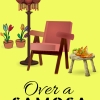
Kicking the rusted stand of the bicycle, he murmured, "Silly old couple!” . The two-storey house in Pandharpur faded away in the rear-view mirror of his bicycle, as he pedalled towards the tea stall located at the crossroads. He had this nagging feeling that the lady of the house was watching him, her bony face framed by the olive green window.
Tribhuvan had bagged an opportunity for a six-week internship with a media firm. It was a covert mission to know more about honour killings in the villages surrounding Pandharpur. This was his stepping stone to the world of journalism. To everyone including his parents, Tribhuvan was here to study life in rural India.
His grandfather had found accommodation for Tribhuvan at a friend’s place. The retired postmaster, Raghupathy and his wife, Saveetha, owned the lone concrete house located on a dead-end street. A dilapidated clinic and a permanently locked house flanked the property on either side. Behind the house was a large sunflower field, ploughed and ready for the next season. One could also see a brick kiln at the distance. The vast vacant space meant even the tiniest of whispers echoed across the kiln as dusk got closer.
The postmaster’s children had migrated to the shores of America decades ago and Tribhuvan was asked to use the room located in the first floor, a small accommodation built over a portion of the terrace. The exterior of the walls was covered in Warli paintings - stick figures carrying drums and spears and flowers and fire, perhaps telling the viewer some story. The paint shone by the light of the lanterns at night, making the characters come alive.
On the evening of his arrival at Pandharpur, Tribhuvan went to the store to get his mobile recharged and procure a cycle on rent. On returning, he found his room ransacked. When he confronted the postmaster, Raghupathy had reprimanded his wife.
"I just wanted to make sure he does not have a cigarette and all those things in the room!" she said, casually.
When he went back to his room, he saw a heap of feathers, black paint and a knife lying at his doorstep. Aaji walked up, gathered everything and went away.
The next day, Tribhuvan acquainted himself with the landscape of the dusty village, making friends at the grocer’s and the tea stall, introducing himself as a student studying to become a journalist. He even met the teacher from the Government school, Chameli – the only postgraduate in the entire village.
He returned home to the sound of crickets chirping and a drunk male voice calling out to someone at the kiln. There was nobody on the ground floor. He climbed up the small fleet of stairs and put his right hand on the door to his room. It opened on its own with a loud creak and was hit by the pungent smell of onions. A face held inches close to his own glared at him. Letting out a short gasp, Tribhuvan stepped back and hit his head on the lantern. He could make out the silhouette of a woman in the moving light. The woman headed downstairs without saying a word. Aaji? Or a domestic help? He ran inside and switched on the light to check if his belongings were intact. “I should have used the torch on my phone!”, he thought.
The events of the previous night made Tribhuvan restless the next day. At dusk, he retired early to his room and decided to make journal entries in his laptop. He was sitting at his desk, adjusting the lampshade to focus on his laptop, when he heard the ruffle of fabric and the sound of quick footsteps. Bangles? Anklets? Was he hallucinating? When he got up to see if somebody was there in the room, he found the door slightly ajar. He did not remember leaving it that way. He closed it and continued with his work. The ruffle of fabric was heard again, this time much closer to his chair. He could feel a lump in his throat. He turned around. Aaji was standing with a broom behind him. She began cleaning the room, in complete silence. Should he feel relieved? Every time he started typing something, she would noisily dust some piece of furniture, fixedly staring at him. After half an hour of unsettling silence, she left the room, closing the door behind her. Tribhuvan was now in two thoughts about continuing in this place. He even contemplated packing his stuff right away. He felt nauseated.
In a few minutes, he sensed he was being watched again. Aaji was standing outside the room and smiling at him through the window. He did not know for how long she had been doing this. When he returned an embarrassed smile, she asked him to open the door. She sat down to gossip about the villagers. It was so normal.
One Sunday, Tribhuvan woke up to the tinkling of bells. When he came downstairs, the animals in the barn had vermillion smeared on their forehead. Aaji was busy showering flowers on them. The sight made him happy. Just then, Raghupathy tapped him on his shoulder.
“Today is new moon day. It is considered very good for ancestral worship and ritual sacrifice. Aaji’s hands will be red today”, he said, laughing, and went away.
Ritual sacrifice? Red hands? The thought sent a chill down his spine. Should he stay further and try to know more, or drop everything and run? Evenings scared him now. What should he tell his grandfather?
That night, he could hear his heartbeat, as he locked himself inside the room and tried to concentrate on his work. Suddenly, there was a light by the window. He looked out to see Aaji holding a lantern in one hand and vigorously scrubbing and repainting the stick figures on the wall. When he offered to switch on the electric bulb, she yelled at him in a strange dialect and hurried downstairs. He looked at the wall. The stick figures glowed in a fresh red colour. “I will stay, come what may!”, he told himself and tightened his fist around the small idol of Sai he had placed on his desk. He turned the table and placed the chair behind it, facing the door, so he could avoid being surprised. He kept looking up every few minutes to see if the old woman had barged in.
It had been two weeks since his arrival at Pandharpur. Barring a few stray incidents of sibling rivalry and petty thefts, there was nothing much he heard about. Whatever was happening in the village was being deftly pushed under the carpet and hidden from the world. The house he was lodged in seemed to have more to investigate about than all the surrounding villages put together.
Tribhuvan stationed his cycle at the tea stall and grabbed the newspaper from the rack. “Anything new, masterji?“ he asked the tea seller.
“What can be new in a village? There are days when I have prayed for a petty fight so people can come and talk about it in my stall! You are going to be a patrakar. So you always want something to happen! But we are not fillum people, beta! Sit down. I will make a special tea for you,” the man patiently explained.
Tribhuvan sat on the wooden stool, his ears tuned to hear the frequency of news he was looking for. Everyone coming to the tea stall greeted the ‘presswallah boy from the city’. Tribhuvan sipped on his tea, observing the people around him. After half an hour, he tucked the newspaper in his backpack and prepared to leave. As he got closer to his cycle, he noticed red drops on the wheel. His mind rushed back to the conversation about the ritual sacrifice the previous evening. He tried to shake the thought away and moved closer. Was the brown calf in its usual place when he left this morning? He trembled. He inched closer to the cycle. A piece of blue fabric was stuck on the stand. It resembled the material of his trousers. Puzzled, he checked for wounds in his legs but found none. The trousers were intact too. He did not remember seeing any of this when he started from the house.
His next regular stop was the dhaba by the check post. The tea stall, the dhaba, the temple…he had planned his unassuming targets for gathering information well ahead of his assignment. The grapevines mattered a lot in a covert operation. He cycled two miles towards the highway and stopped when he saw the usual lineup of trucks at the dhaba. He settled on one of the rope-knit cots and waved to the dhaba owner, Sartaj. He looked around and noticed an unusually high volume of customers that day. Sartaj greeted Tribhuvan in a tone that was more cheerful than usual.
"Paaji, looks like you are having a good day!" Tribhuvan exclaimed. Sartaj walked up to the cot, with a steaming paratha and lassi in his hands and placed it before the young boy.
"Which day is not a good day, puttar? Tell me! But since you think so, yes, there is a political rally today in the neighbouring village. So I am expecting more customers. You are going to be patrakar. You should know all this better!", Sartaj said, with a twinkle in his eyes, before getting back to work with the huge sizzling tawa.
Tribhuvan ate his breakfast, watching the people around him. "Arey! It has come in the paper today. No matter how much we pay to hush the hospital, the press wallah gets to know", he heard a voice from one of the neighbouring rope cots.
What were these men talking about?
"Next time, we should make sure things don't go all the way to the hospital", said another voice. “These people take money from everyone”.
Tribhuvan rolled the remaining parantha, pushed it down his throat and gulped down the lassi. He put the plate on the small stool by the cot and went to wash his hands. He then opened his backpack to pull out the newspaper. The inside of the paper felt soggy, so he carefully unfurled it and turned the pages. Somewhere around the centre of the sixth page was a small article with blood red colour smeared on it. He tried to gently brush away the red, but only ended up creating a gaping hole in its place. “This could be it!”, he thought, “I will find out… But where did that mark come from?”
"Chameli will definitely know what this news is all about. Let me go meet her. She must be back from her tuition class by 10.30," Tribhuvan decided. He quickly put the paper into the bag, wrinkling his nose at the strange stench that emanated from it. "I should remember to wash the socks once I get home. I wish I was in Pune now," he chided himself. Overwhelmed, he took out his mobile phone and sent a message to his mom “Aayi! I miss you. Can’t wait to have breakfast at home”. He paid Sartaj, wished him a good day and then left the dhaba.
If this led to something tangible, not only would his career be on track, he could also get back to the city soon. He pedalled for another half an hour and across two villages, fueled with enthusiasm. He drove past the school in the third village, came to a halt outside a brick house and rang the bell of his cycle continuously.
A dusky girl, beautifully dressed, appeared at the balcony and waved to him, gesturing him to wait. As he watched her come down the staircase, he sensed a movement in the corner of his eyes. He turned to catch a fleeting glimpse of the post master's wife staring at him, with her nose against the grill of a window on the ground floor. Tribhuvan broke into a sweat. What was happening to him?
Just then, someone tapped him on his shoulder. His heart skipped a beat. He turned to see Chameli.
"Chameli! Do you have guests at home? You are so well dressed today. What is the occasion? " he remarked.
"No, there is nobody at home!" she replied, appearing surprised. Tribhuvan was uncomfortable. He thought he had seen the old woman.
"Okay! Did something happen in your village last week? What news are they talking about, that appeared in the newspaper? " he asked her.
"Tribhuvan! I have something to tell you and someone you should meet. Let us go to the mangrove. Wait here a minute" she said and quickly ran into the house. She came back, with a bag on her shoulder and her mobile phone, and locked the ornate wooden door.
Puzzled, with his head bent towards the ground to avoid seeing images of the old lady around him, Tribhuvan waited. Suddenly, the faint smell of paratha hit his nose. When he looked up to see where it was coming from, a pair of hands grabbed his neck from behind and dragged him backwards. The edge of Tribhuvan's trouser got caught in the cycle stand and ripped apart. Blood from his calves dripped on the wheel of the cycle. The old postmaster appeared before him, his eyes red with anger… and before he realised what was happening, something struck his head and shattered. He felt himself being carried, and the voice of the tea seller in the distance. But his legs had gone numb.
Tribhuvan felt very hot. The heat singed his skin. He was not able to breathe. Fits of a cough jolted him awake. He was sitting on a pile of wood. There were familiar faces around him. His trousers caught fire. He let out a blood-curdling yell but could hardly hear his voice. The old lady dragged Chameli by her braid and flung her into the fire too. “Liar!” she called out.
A splash of water hits him. Tribhuvan wakes up, gasping for breath. The postmaster was staring at him, perplexed. Saveetha Aaji’s hands were offering him a glass of tea. Tribhuvan was still trembling from his nightmare. Once, the two leave. A feverish Tribhuvan gets ready hastily. He takes out his cycle to go to the tea stall.
As he adjusts the rearview mirror, he sees Aaji at the window. When he looks down, he is wearing blue trousers.
About the Author







Comments